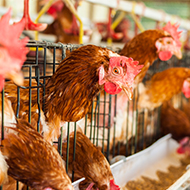Many farmers undecided about BTV-3 vaccination, survey finds
There have been over 160 cases of BTV-3 in the current vector period.
There is hesitancy about bluetongue virus serotype 3 (BTV-3) vaccinations among farmers, initial findings from a survey looking at the impact of the outbreak on farmers suggest.
Over half of the farmers who responded said they remain undecided about vaccination, though a significant number, particularly sheep farmers, said that they plan to vaccinate before the next summer season.
The survey, which is being conducted by Ruminant Health & Welfare in collaboration with Flock Health Limited, the Agriculture and Horticulture Development Board (AHDB), and the University of Nottingham, has also revealed the impact that the outbreak is having on farmers.
Some have reported that it has become more difficult to sell their livestock. Another, who had experienced mortality on their farm due to bluetongue, described the experience as “horrible; physically, financially, mentally and emotionally.”
Alongside the survey, the Animal and Plant Health Agency is studying the impact of the virus on premises where it has been confirmed. Signs seen in infected animals include lameness, swollen faces, nose and mouth ulcers, drooling, breathing difficulties, nasal discharge, and mortality.
Fiona Lovatt, of Flock Health Limited, said: “We know that in Germany, the research shows a marked difference in outcomes between vaccinated and unvaccinated herds and flocks.
“Findings indicate that unvaccinated sheep flocks have experienced mortality rates as high as 30 per cent, whereas vaccinated flocks show significantly lower mortality, with some reporting only 1-2 per cent losses.
“We want to learn from this data and build a UK base of evidence that we can trust going forwards.”
Bluetongue is a notifiable disease. Suspected cases must be reported on 03000 200 301 in England or 03003 038 268 in Wales. In Scotland, suspected cases should be reported to the local field services office. Suspected cases in Northern Ireland should be reported to the DAERA Helpline on 0300 200 7840 or by contacting the local DAERA Direct Veterinary Office.
Image © Shutterstock



 An Avian Influenza Prevention Zone (AIPZ) has been introduced across Wales.
An Avian Influenza Prevention Zone (AIPZ) has been introduced across Wales.